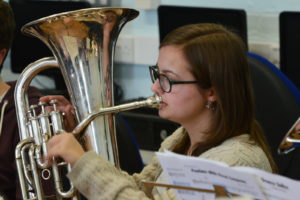Why Play the Baritone/Euphonium?

Why Play the Baritone/Euphonium?
Baritones and euphoniums are very similar in design — so much so that they are basically interchangeable instruments as far as today’s written music is concerned. That being said, the baritone is just slightly smaller than its almost-look-a-like, with a brighter more solid sound than the euphonium. Both instruments are sometimes provided to you by the school, at least in the beginning, but if you need to rent one, Art’s Music Shop is here to help. So why play baritone/euphonium?
For some beginning band students, it’s hard to choose what musical instrument to play. Each band instrument has something intriguing to offer, whether it be the shape of the instrument itself, what it is made of, the sound that is produced when the musical instrument is played, where that particular instrument section sits in the band, and much more. But there are many great reasons to play baritone/euphonium in school band:
♦ The low brass section, which includes trombone, baritone/euphonium and tuba, is the base and foundation of any band/wind ensemble, so when you perform on the baritone/euphonium in band, you play a key role in the group’s success.
♦ There is very little to assemble on a baritone/euphonium. All you have to do is place the mouthpiece into the lead pipe.
♦ The baritone/euphonium has a wide range, and its sound is consistently rich and pleasing throughout. It is flexible in both tone quality and intonation. Therefore, it blends well with most any combination of instruments, but is most widely known for its place in concert, marching and brass bands.
♦ Baritone/euphonium fingerings are the same as the trumpet, so it would be easy for you to learn the trumpet after you’ve mastered the baritone/euphonium, should you want to do so.
♦ Baritone/euphoniums typically have extremely important parts in many marches (such as those by John Philip Sousa), and in brass band music of the British tradition.
♦ Baritone/euphoniums not only play bass lines — they also play middle harmony lines and solo/melody lines as well. Plus, they blend seamlessly with other brass and woodwinds, especially low-register clarinets and saxophones. If you play the baritone/euphonium, you’ll have the opportunity to play all ranges of music.
♦ Baritone/euphonium is another one of the lesser-played instruments in the band, making it a good one to excel at if you want to try and get scholarship money for a higher education.
